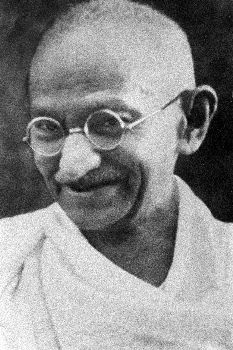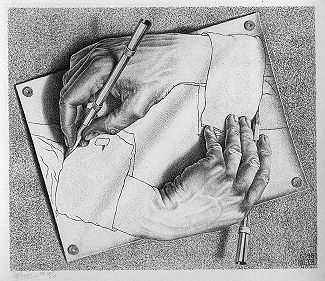
Portrait of Gandhi (Wikipedia)
Both well and lesser known examples abound: we are, as individuals and a species, capable of amazing transformations, of fulfilling potentials many of us scarcely realize we have. Often it is simply a matter of how we see ourselves. This basic view can have profound effects on what we might do and be. While conventional opinions of our limitations could hold us back, yet many people's lives have shown that apparent obstacles in ourselves or in our circumstances can be overcome.
The literature of multiple personality disorder (also called dissociative identity disorder) includes records of people with distinct personalities having widely divergent IQs and other abilities, brilliant, average, and seemingly retarded separate entities residing in the same body. They can even have quite divergent sensory abilities, one needing thick glasses, another enjoying 20-20 vision, and so on.
 Portrait of Gandhi (Wikipedia) |
Similarly with people in hypnotic states. In fact, the latter can often show other changes that augment their ordinary consciousness abilities in various areas.
Language alone may be a powerful indicator of enhanced or diminished potential. Currently cancer free patients with similar disease histories who are described as "cured" have on average substantially better long-term outcomes than others described as merely "in remission."
Patients with severe, even terminal extents of clinical depression, who if given a chance might use the first opportunity to kill themselves, can become creative, optimistic, spontaneous, and eager to enjoy life once exposed to profound openings of the inner realm. Breathing air that is a higher than usual mix of oxygen and carbon dioxide concentrations can help them briefly see vastly more than they are aware of in ordinarily constricted, depressed worldviews. Such temporary "insanity" can radically alter impulses toward self-destruction, releasing intense wills to live.
People who are in love can see life in heightened ways. It is as if they are more alive, as though they themselves, their partners, even their surroundings are experienced as intensely vital, vivid, and beautiful.
Folks of diverse religious backgrounds, and some who are not even spiritually inclined, have reported profoundly exalting, positive changes in how they see themselves, others, and the world. These can be so moving that they relieve the effects of prolonged prior suffering.
Many are the times a simple shift of perspective, for instance seeing one's metaphorical glass of life experience as at least half-full instead of half-empty, can restore a sanguine attitude and genuine interest in day-to-day life.
Each moment for some can involve a tendency to obsess on the things which have not lived up to our expectations or about the impediments we see ahead to getting where we want to be in life. By contrast, merely looking more deeply into what is occurring in our own immediate environments can both distract us from bothersome concerns and enrich our engagement with the present.
Gaining a new friend may increase one's sense of well-being.
Olympics winners have found that much of the challenge is met by simply visualizing in detail doing what is needed to achieve their targets.
Noticing things of which we might not even have been really aware before can be like taking off our blinders. This might be tried, for example, with photography, the study of nature, visual arts, our dreams, gardening, meditating, woodworking, and interacting in a friendly way with others whom we might before have just avoided or noticed in but a cursory fashion.
Suppose we each tell ourselves or our kids not that we have many reasons we can never achieve our hopes and goals but instead that each of us has within him or her a unique and special genius, and we have then unique opportunities to discover and fulfill what that is.
Attending to one another, really seeing and hearing those with whom we come in contact, can be life changing for ourselves, them, and the relationships that may develop between us.
I recall an interview with a quadriplegic gentleman who nonetheless was so charismatic in how he focused on those around him that he was more appealing and interactive than most "able-bodied" folks going about their busy lives.
 E. C. Escher - Titled Drawing Hands (Wikipedia) |
We may look at our remaining time on Planet Earth as if we already have one foot in the grave or, to a degree at least, live consciously, mindfully in each moment. Our tendency is likely do be "asleep," seldom waking into richer awareness. Yet we can train ourselves in easy ways to really see when we look, feel when we have emotions, and relate with others as if we in fact care who they are.
Are we living in a mental rut, hardly varying our reactions, perceptions, biases, prejudices, or expectations? We can ask ourselves what we have noticed new about a particular person, object, setting, pet, natural phenomenon, aspect of our own sensation or physiology, and so on. We might make it a game, for example trying to do things in ways that may seem awkward at first, like drawing with the non-dominant hand.
Children sometimes make good teachers for adults who are too set in their ways, for secure kids can be all about discovery, curiosity, awe, and a sense of fun and adventure.
With her teachings and writings, social psychologist Ellen Langer has for several decades now been helping folks see that they need not be prisoners to their current views of life's possibilities. She espouses "mindfulness," which she describes not in an esoteric, meditative tradition way but as "the simple act of actively noticing things." In her view, it takes but a moment to shift mental gears in this way, yet with significant results. This deliberate method of observing keeps us in the here and now, and that, in turn, sets the stage for being alive and so knowing joy.
What if instead of a disease, she says, alcoholism were regarded as an allergy?
What if we could see ourselves as more youthful, for in so perceiving we tend to make that notion real?
What if we were to understand that we are just naturally involved, all the time, in our own healing and, in a sense, need to merely step out of the way of that?
She asks: What is the farthest a human being can run? Then, whatever most of our answers may be, she points out that there are individuals in the world that have run many times that distance? Constantine Karnazes, for instance, in 2005 at age 53, ran 350 miles in less than 81 hours, without sleep.
Suppose we looked at all the limitations we think we have that way as just notions that may not really be true?
What if aging is not a fixed and certain rate of inevitable decline?
Her books, including Counterclockwise, Mindfulness, and On Becoming An Artistt, emphasize how readily one can see afresh, gain richer quality living, and reduce or eliminate seeming barriers we may have thought we had to becoming who we wish to be.
Whether a goal is to live well in this very instant or to get more out of the rest of our lives, her provocative lessons might be good places to start.